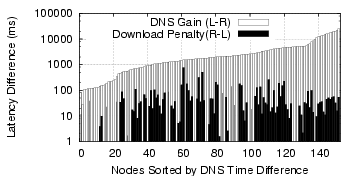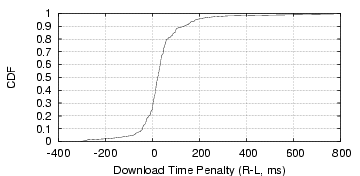 (a) DNS Lookup Time Gain
vs. Downloading Time Penalty
|
 (b) Cumulative
Distribution of Downloading Time Difference
|

CoDNS replaces slow local responses with fast remote responses, which may impact DNS-based CDNs [1] that resolve names based on which DNS nameserver sends the query. CoDNS may return the address of a far replica when it uses a peer's nameserver result. We investigate this issue by testing 14 popular CDN users including Apple, CNN, and the New York Times. We measure the DNS and download time of URLs for the logo image file on those web sites, and compare local DNS and CoDNS when their responses differ.
Since CoDNS is used only when the local DNS is slow or failing, it should come as no surprise that the total time for CDN content is still faster on CoDNS when they differ in returned IP address. The DNS time gain and the downloading time penalty presented in the difference between local and remote response time is shown in Figure 17(a). When local DNS is slow, CoDNS combined with a possibly sub-optimal CDN node is a much better choice, with the gain from faster name lookups dwarfing the small difference in download times when any difference exists. If we isolate the downloading time difference between the DNS-provided CDN node versus the CoDNS-provided CDN node, we get Figure 17(b). Surprisingly, almost a third of the CoDNS-provided nodes are closer than their DNS counterparts, and 83% of them show less than a 100ms difference. This matches the CDN's strategy to avoid notably bad servers instead of choosing the optimal server [8]. Results for other CDN vendors are similar.
 (a) DNS Lookup Time Gain
vs. Downloading Time Penalty
|
 (b) Cumulative
Distribution of Downloading Time Difference
|